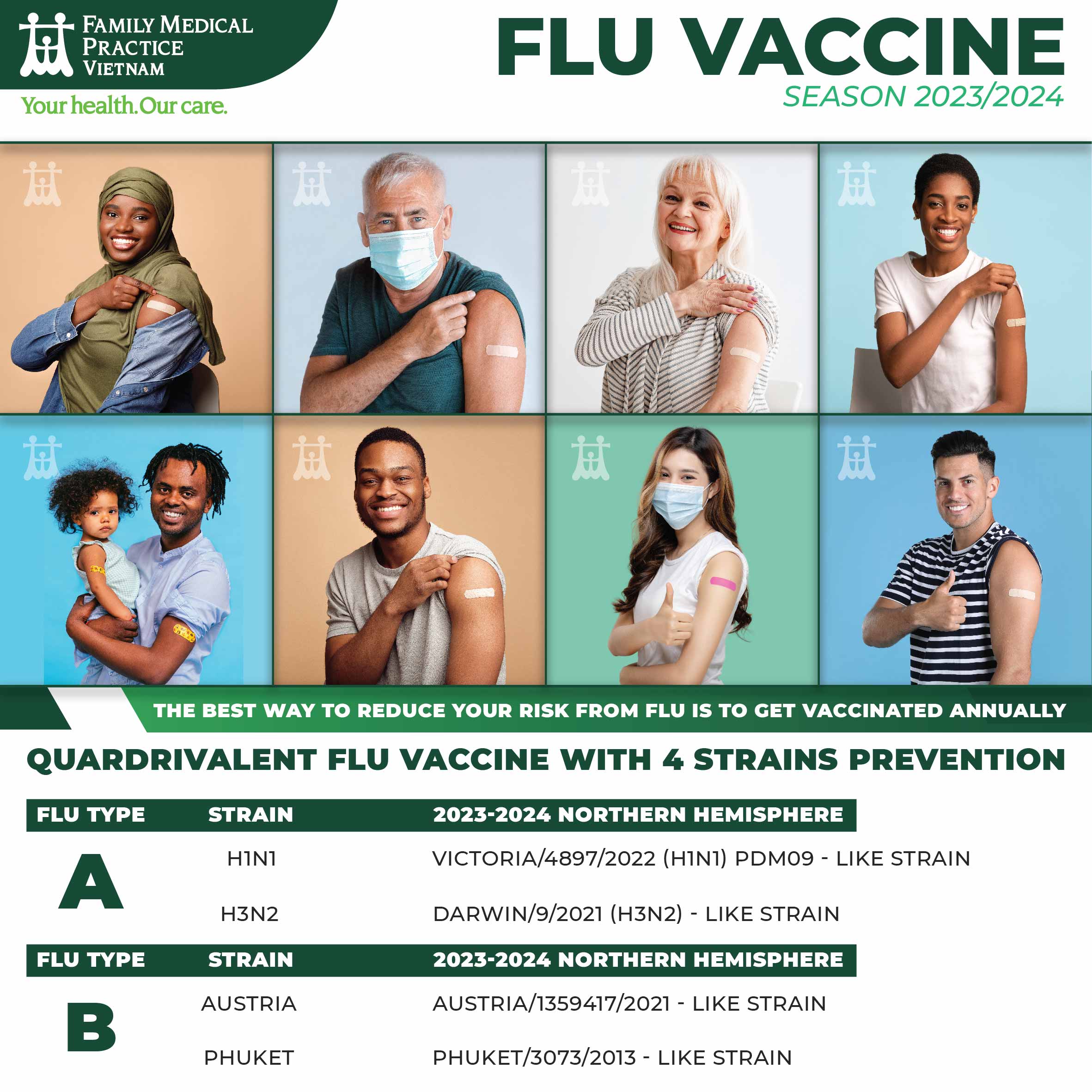Influenza: Vaccination as top preventions

Influenza (Flu)
Influenza, also known as flu, is a respiratory infection caused by influenza viruses. This will cause you sudden illness and usually lasts for 7 to 10 days. Most people can recover from the flu completely within a week without medical treatment. However, for the elderly, young children and people with certain health conditions, the flu can be serious and even lead to death from complications.
According to the statistics of the World Health Organization (WHO), every year about 10-15% of the population gets the flu, the death rate from influenza is estimated at 250,000 - 500,000 people.
Type of influenza
According to CDC, there are four types of influenza viruses: A, B, C and D. Not all flu are created equal: Some types can make you very sick, whereas other types of flu may cause milder symptoms.
- Influenza type A viruses are capable of infecting both humans and animals. Wild birds act as the hosts for this flu virus in common, which they also named influenza type A virus is bird flu. Type A flu virus is constantly changing and is generally known to cause flu pandemics. A pandemic may occur when a new influenza A virus emerges that infects people with the ability to spread efficiently to the society. The most common flu hot spots are those surfaces where an infected person has physical contact, especially areas where they have been sneezing.
- Influenza type B virus is found only in humans. Type B flu may not cause a severe reaction as type A flu virus, most patients will recover after a few days resting without medical treatment. However, type B flu can still be extremely harmful for some cases. Influenza type B viruses are acknowledged to not cause pandemics.
- Influenza type C virus is a lesser known type of influenza virus that commonly causes cold-like symptoms and sometimes causes lower respiratory infection. Influenza type C virus is mainly a human pathogen; however, the virus has been detected in pigs, dogs, and cattle, and rare swine–human transmission has been reported. Flu type C is known to not cause epidemics.
- Influenza type D viruses are not known to infect or cause disease to human. They mainly affect cattle and do not cause epidemics.
Influenza symptom
Flu signs and symptoms usually come on suddenly. People who caught flu might feel some or all of these below symptoms:
- Fever or feeling feverish/chills
- Cough
- Sore throat
- Runny or stuffy nose
- Muscle or body aches
- Headaches
- Fatigue (tiredness)
- Vomiting and diarrhea (more common in children)
It is important to note that anyone can get sick with flu, even healthy people, and serious problems related to flu can happen to anyone at any age. However, there some people are at higher risk of developing serious flu-related complications if they get sick.
This includes people 65 years and older, people with certain underlying medical conditions (such as asthma, diabetes, or heart disease), pregnant women and young children, especially those below 2 years old.
Influenza prevention
Flu vaccination

As recommended by CDC, a yearly flu vaccine should be taken by everyone aged 6 months and older as the first and most important step to protect against the flu viruses. This has been recommended since the 2010-2011 influenza season by CDC’s Advisory Committee on Immunization Practices.
Flu vaccines help to generate antibodies in the body about two weeks after vaccination. These antibodies help to fight off circulating influenza before they can cause illness in people. Seasonal flu vaccines are developed to protect from influenza virus that research indicated to be the most common for the upcoming season.
This flu season 2023/24, we will have the Influvac Tetra vaccine containing inactivated fragments from four types of influenza virus. This type of vaccine is also known as a quadrivalent influenza vaccine, which means they protect against four different flu viruses.
For this year, the vaccine will help to protect you from an influenza A(H1N1) virus, an influenza A(H3N2) virus, and two influenza B viruses. This vaccine can be used in adults and children 3 years of age and older.
In order to register for flu vaccination, please help to use this form.
Preventative action
Remember to take everyday preventive actions that are recommended by CDC to reduce the spread of flu.
- Limit contact with people who are sick.
- If you are sick, distance yourself from others to not spread the disease
- Reduce the spread of viruses when you cough or sneeze by covering up your nose and mouth with a tissue. Throw the tissue to the recycle bin after use.
- Remember to wash your hands often.
- Try not to touch your eyes, nose, and mouth as germs can spread this way.
- Clean and disinfect surfaces and objects that may be approachable to flu viruses.
Additional precautions may be taken following the local governments under the context of COVID-19 pandemic.
 We use cookies on this website to enhance your user experience
We use cookies on this website to enhance your user experience